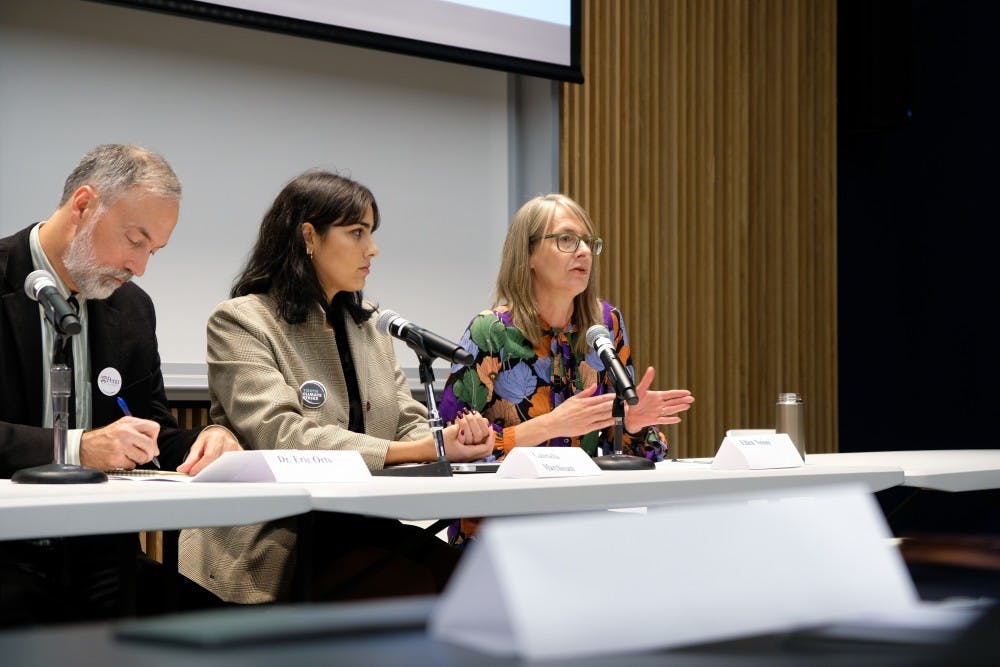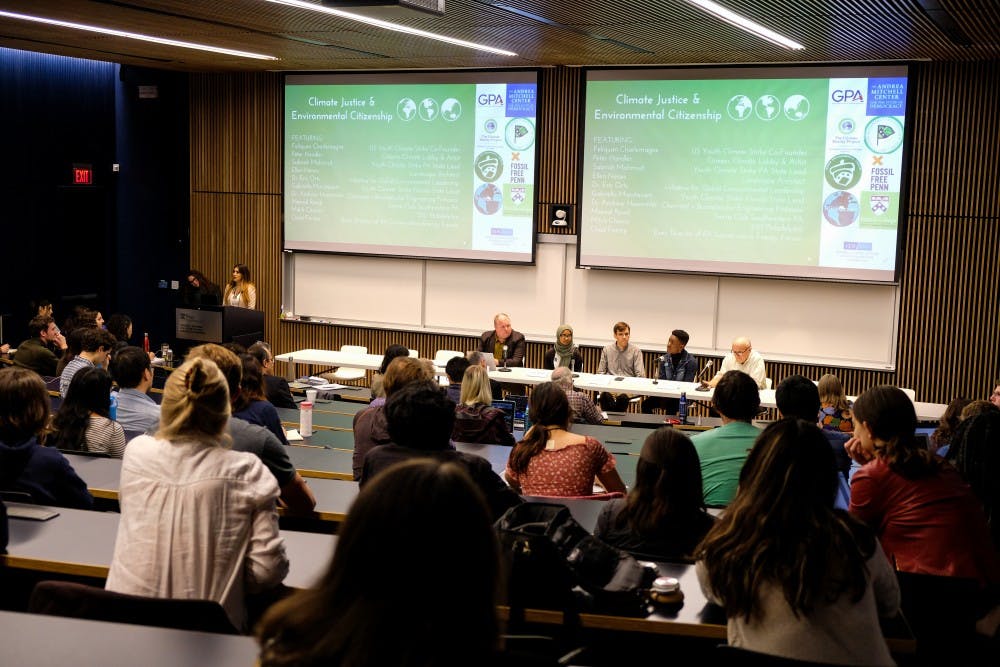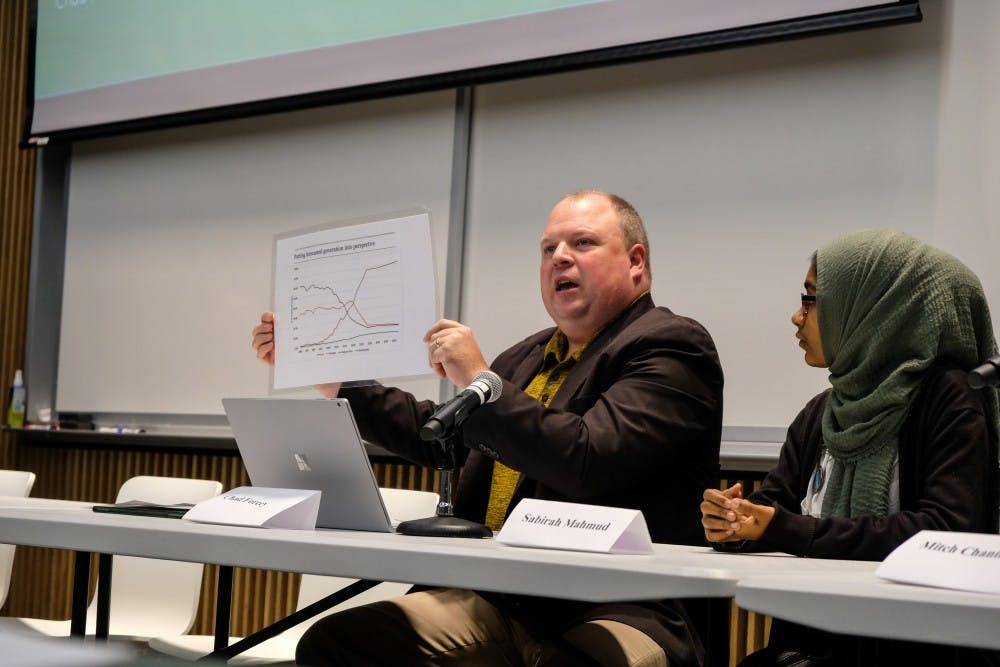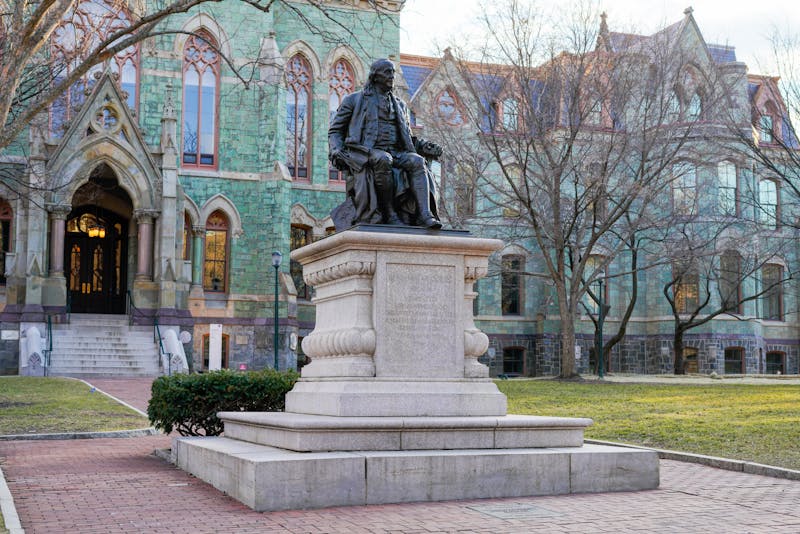
(Left to right) Legal Studies & Business Ethics professor Eric Orts, Lead organizer of the Florida Youth Climate Strike Gabriella Marchesani, and Landscape Architecture professor Ellen Neises.
Credit: Audrey TirtagunaNearly a dozen activists, academics, and professionals joined a panel on Tuesday evening to discuss the political and social consequences of climate change.
The event, titled “Climate Justice and Environmental Citizenship,” hosted panelists ranging from environmental activists and Penn faculty to industry professionals. Prompted by questions from student groups and audience members, the speakers talked about inequality caused by climate change, investment in fossil fuels, and political and social responsibility.
The event was hosted by the Penn Government and Politics Association and co-sponsored by the Stavros Niarchos Foundation Paideia Program at Penn, the Andrea Mitchell Center for the Study of Democracy, and several sustainability-focused student groups.
Panelists came to a consensus that climate gentrification largely affects people of color and people of lower economic classes. Lead organizer of the Florida Youth Climate Strike Gabriella Marchesani cited the example of sea-level rise in Miami, which she said has mostly affected minority communities.
Race and class also influence people's ability to protest climate change, Marchesani said. Prompted by an audience question about the feasibility of American protests similar to London’s recent Extinction Rebellion demonstrations, Marchesani said arrestable protest in America is “not safe unless you’re a white man” because of racial intolerance.

Panelists came to a consensus that climate gentrification largely affects people of color and people of lower economic classes.
Panelists also discussed Penn's investment in the fossil fuel industry after Fossil Free Penn raised a pointed question regarding the morality of higher education institutions investing in the industry. Chemical and Biomolecular Engineering professor Andrew Huemmler and Legal Studies & Business Ethics professor Eric Orts both urged the University to divest, agreeing that the school has a moral and reputational responsibility to uphold.
“Penn is not taking any positive step on the investment policy,” Orts said. “At a minimum, Penn should make a full divestment from the coal industry.”
Huemmler also warned of the economic risks of fossil fuel investment, calling Penn's approach "out of date" and arguing that the value of fossil fuels depends on geopolitical stability. He also argued that political lobbying and donations by the fossil fuel industry are a threat to American democracy, citing federal and state decisions to prioritize funding from the oil and natural gas industry.
“No climate solution will not be at the detriment of the fossil fuel industry,” added panelist Sabirah Mahmud, lead organizer for the Pennsylvania Youth Climate Strike. “Votes made by their wallets are more important than our votes.”
Chad Forcey, executive director of the Pennsylvania Conservative Energy Forum, agreed that natural gas lobby funds harm individual voters, pointing to rural farmers with less influence who face environmental pressures such as increased precipitation.

Chad Forcey is the executive director of the Pennsylvania Conservative Energy Forum.
Panelists agreed that fighting climate change will require large changes to both individual lifestyles and the global economy.
Landscape Architecture professor Ellen Neises stressed the magnitude of lifestyle changes needed to reduce climate change, calling for “adaptations to a new way of living” that include lower consumption and “ultra-low carbon” living.
Orts called for a “total transformation of what capitalism looks like,” including a ban on coal, a quick move away from natural gas, 100% electric transportation, the creation of high-paying jobs in sustainability, and technological advancements in architecture.
The panel was the first in a series of events hosted by Penn GPA and the Andrea Mitchell Center. The event series, known as "Conversations," brings guest speakers from diverse disciplines to discuss political topics with on-campus groups.
“I want students to be able to understand and believe that we can come together as a community and as a world to solve these issues,” said College junior Rachel Steinig, who is Penn GPA's vice president of external affairs.
“It’s not just people causing the issues on one side and people advocating on the other side. We really can and need to come together to deal with such an interdisciplinary problem.”
The Daily Pennsylvanian is an independent, student-run newspaper. Please consider making a donation to support the coverage that shapes the University. Your generosity ensures a future of strong journalism at Penn.
Donate






